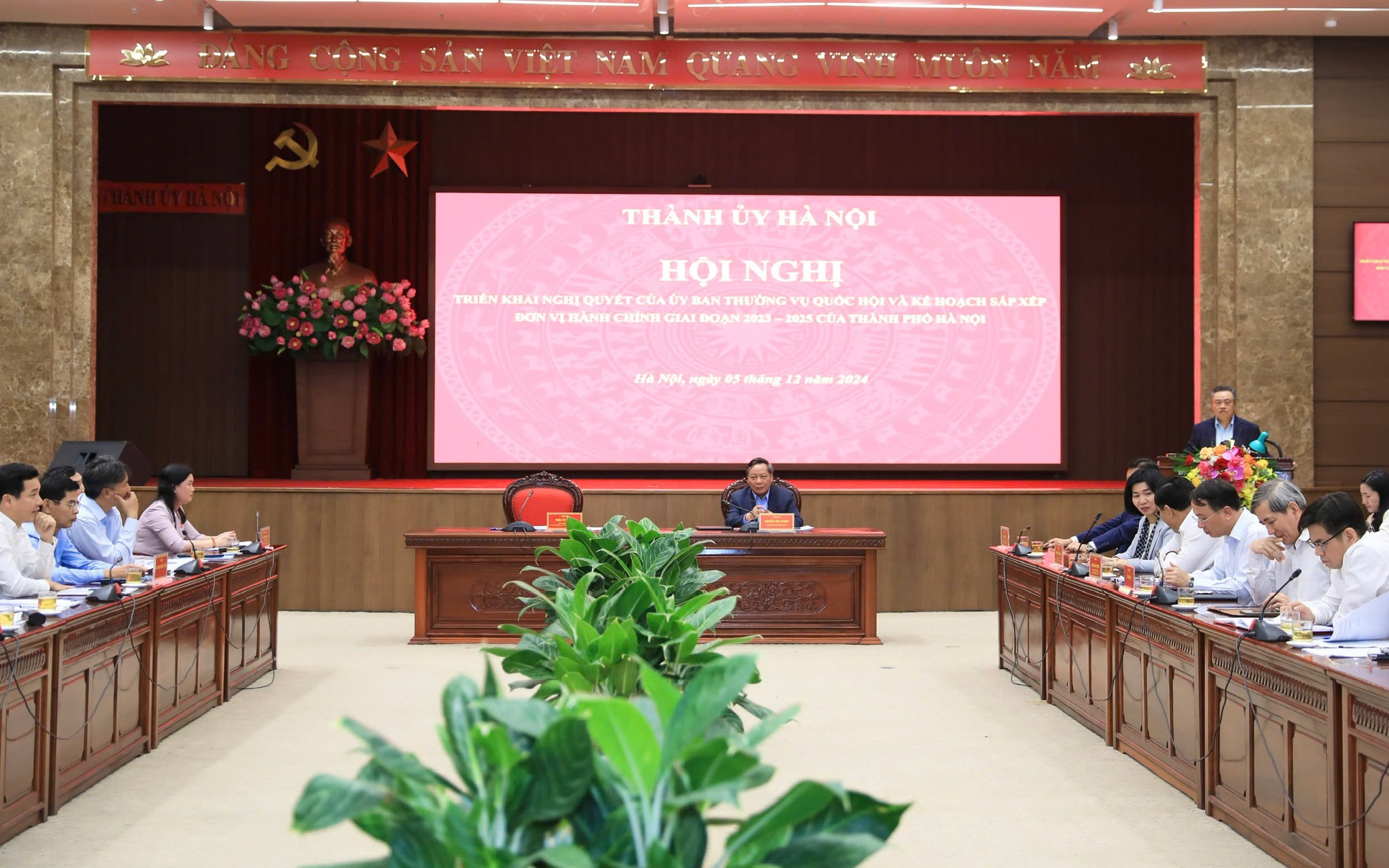The Hanoi Party Committee on December 5 held a conference to implement the Resolution of the Standing Committee of the National Assembly and the plan for administrative unit restructuring in Hanoi for the 2023-2025 period.

Overview of the meeting.
At the conference, Director of the Hanoi Department of Home Affairs Tran Dinh Canh briefed participants on Resolution No. 1286/NQ-UBTVQH15 regarding the restructuring of commune-level administrative units in Hanoi from 2023 to 2025, which will take effect on January 1, 2025. The resolution outlines the restructuring of 109 commune-level administrative units to form 56 new units across 20 districts, towns, and city areas in Hanoi.
Once the resolution takes effect, Hanoi will have 30 administrative units at the district level, including 17 districts, 12 urban districts, and 1 town; 526 administrative units at the commune level, consisting of 345 communes, 160 wards, and 21 towns (a reduction of 53 commune-level units from the current number).
Canh also presented Plan No. 345/KH-UBND to implement Resolution No. 1286/NQ-UBTVQH15 on the restructuring of Hanoi's commune-level administrative units from 2023 to 2025.
At the conference, delegates, including district and commune party secretaries, expressed strong agreement with the Party Committee's plans and the guidance of relevant departments. They also raised some challenges in the restructuring process at certain communes, such as the timing of the local People's Council meetings, the adjustment of surplus part-time staff, and the appointment of personnel in newly formed administrative units.
During the meeting, Head of the Hanoi Party Organization Committee Vu Duc Bao and Director of the Department of Home Affairs Tran Dinh Canh addressed the delegates' concerns and recognized the proactive efforts of localities in the administrative restructuring process.
In his speech, Permanent Deputy Secretary of the Hanoi Party Committee Nguyen Van Phong urged all Party secretaries to focus on leading and directing the restructuring process with utmost proactivity. He also emphasized the importance of public opinion management and maintaining the quality of thought work during the process. Alongside the restructuring efforts, preparations for the Party Congress must continue, ensuring adherence to the established plan and timeline.
Permanent Deputy Secretary Phong further requested that all Party secretaries take direct responsibility for leading the implementation, as this is a critical task for the entire political system. Deputy Chair of the National Assembly's Law Committee Nguyen Phuong Thuy commended Hanoi's proactive, responsible, and highly committed approach to the administrative restructuring process.
She noted that Hanoi has the largest number of administrative unit restructurings in the country, which reflects the strong determination of the local Party, government, and residents. She acknowledged Hanoi's experience in prior administrative reforms but urged local authorities to address any gaps in guidance, particularly for issues not fully covered by existing regulations. Thuy recommended that Hanoi's authorities summarize and report such issues to the central government for further instructions.
In his remarks, Chairman of the Hanoi People's Committee Tran Sy Thanh praised the serious, responsible, and proactive work of local units in implementing the administrative restructuring. He emphasized that Hanoi has carefully prepared for this task following the central government's directives. He expressed confidence that with clear guidance and strong coordination, the process would be successful.
Chairman Thanh also highlighted that while this is not the first time Hanoi has restructured administrative units, the significant difference this time is the role of digital transformation. He urged departments, districts, and towns to focus on applying digital solutions to varying degrees across different areas.
He underscored the principle agreed upon by the Party Standing Committee: minimizing disruption to the daily lives and operations of residents and businesses. This principle is crucial, especially as the Lunar New Year approaches. Chairman Thanh stressed the importance of ensuring timely payment of pensions and allowances for beneficiaries, with prompt solutions for any arising issues. He also emphasized that businesses, especially small and medium-sized enterprises in affected administrative units, must be properly guided on tax procedures, financial transactions, and civil matters. "We must avoid any complaints from businesses, as they should not suffer risks due to administrative unit mergers," Chairman Thanh added.